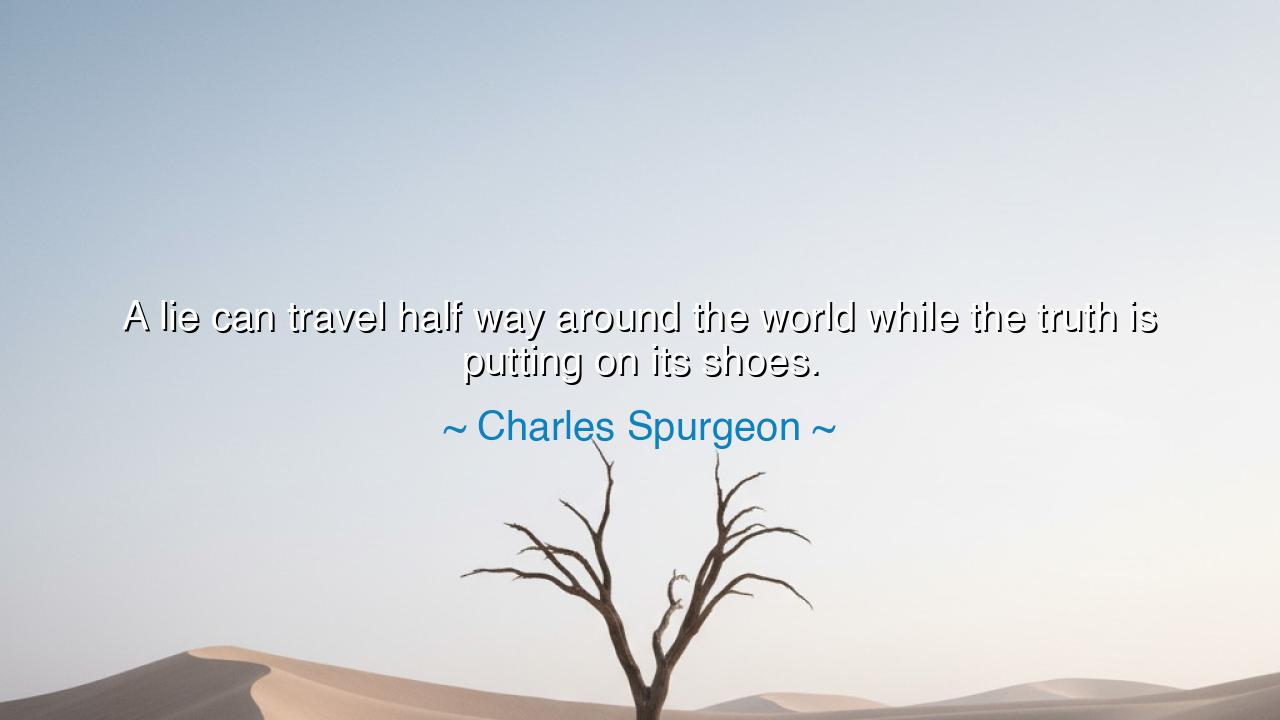
A lie can travel half way around the world while the truth is






Charles Spurgeon, the preacher often called the “Prince of Preachers,” once declared with timeless clarity: “A lie can travel half way around the world while the truth is putting on its shoes.” His words carry the sharp edge of lament, for they reveal how swiftly falsehood moves compared to the slow and stumbling steps of honesty. Though spoken in the nineteenth century, this wisdom resounds even louder in our age of instant communication, where deception spreads like fire on the wind, while truth struggles to be heard.
The nature of the lie is speed. It is crafted for simplicity, often adorned with drama and shock, designed to captivate the ears of men before their reason can awaken. The truth, by contrast, is slower because it is bound to evidence, to patience, to careful explanation. Like a warrior fastening his armor, the truth must put on its shoes before it can march forth. The lie, free of such burdens, leaps quickly from tongue to tongue, unchecked by the weight of proof.
The ancients also knew this danger. The historian Plutarch recorded how rumors often shaped battles before swords were drawn. Armies panicked because of whispers, while cities rose or fell not by fact but by false reports. And in the plays of Sophocles and Aeschylus, we see how a single false word can unravel kings and kingdoms. Spurgeon’s insight is not new—it is as old as humanity itself: the lie is fleet, but the truth is burdened, and thus the race between them is always uneven.
History gives us vivid examples. During the Black Death in medieval Europe, lies spread that Jews had poisoned wells. This falsehood raced like wildfire, inciting massacres across the continent. The truth—that plague was carried by fleas on rats—lagged centuries behind, struggling to put on its shoes. More recently, in modern wars and politics, propaganda and falsehoods have stirred nations to rage, while the truth stumbled forth only after blood was spilled and generations scarred. Each example is proof of Spurgeon’s cry: falsehood is swifter, but swiftness is not the same as endurance.
For though the truth is slow, it is strong. Lies may ignite quickly, but like straw in the fire, they burn out when confronted with reality. The truth, once it has its shoes on, marches with steadfastness, enduring where falsehood cannot. The trials of Galileo, condemned for speaking of the earth’s motion, remind us: the lie of geocentrism spread far and fast, but centuries later, the truth stood unshaken. The lie may race ahead, but the truth always arrives.
The meaning of this teaching is therefore twofold. First, beware the swiftness of lies; do not let their speed deceive you into believing they are strong. Second, do not despair at the slowness of truth. Though it lingers, it is resilient, and once it takes its steps, it travels farther and lasts longer than any falsehood. Spurgeon’s metaphor is a call for patience, for discernment, for faith in the enduring power of what is real.
The lesson for us is luminous: be slow to believe what travels quickly. Question the dramatic tale, the scandalous whisper, the rumor that arrives before its time. Seek the truth, though it is late, though it requires patience, though it may demand effort. For the truth, once found, is a companion for life, while the lie, once revealed, becomes an enemy that betrays.
Practical action flows from this wisdom. Before repeating a claim, pause. Ask: Is this a lie dressed as truth? Before judging another, wait for the shoes of reality to be tied. And when truth finally arrives, stand with it, even if it came late and weary. For to walk with truth is to walk the path of justice, while to run with lies is to wander in darkness.
Thus Spurgeon’s words echo across centuries like a solemn bell: “A lie can travel half way around the world while the truth is putting on its shoes.” Remember them, and you will not be deceived by speed, nor disheartened by delay. For though the lie runs fast, the truth, once prepared, will walk with you forever.






AAdministratorAdministrator
Welcome, honored guests. Please leave a comment, we will respond soon